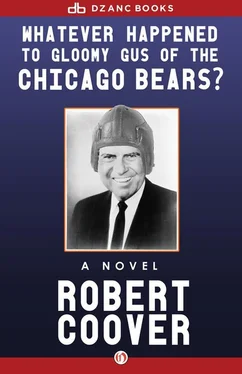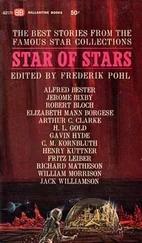Robert Coover - Whatever Happened to Gloomy Gus of the Chicago Bears?
Здесь есть возможность читать онлайн «Robert Coover - Whatever Happened to Gloomy Gus of the Chicago Bears?» весь текст электронной книги совершенно бесплатно (целиком полную версию без сокращений). В некоторых случаях можно слушать аудио, скачать через торрент в формате fb2 и присутствует краткое содержание. Год выпуска: 2014, Издательство: Dzanc Books, Жанр: Современная проза, на английском языке. Описание произведения, (предисловие) а так же отзывы посетителей доступны на портале библиотеки ЛибКат.
- Название:Whatever Happened to Gloomy Gus of the Chicago Bears?
- Автор:
- Издательство:Dzanc Books
- Жанр:
- Год:2014
- ISBN:нет данных
- Рейтинг книги:4 / 5. Голосов: 1
-
Избранное:Добавить в избранное
- Отзывы:
-
Ваша оценка:
- 80
- 1
- 2
- 3
- 4
- 5
Whatever Happened to Gloomy Gus of the Chicago Bears?: краткое содержание, описание и аннотация
Предлагаем к чтению аннотацию, описание, краткое содержание или предисловие (зависит от того, что написал сам автор книги «Whatever Happened to Gloomy Gus of the Chicago Bears?»). Если вы не нашли необходимую информацию о книге — напишите в комментариях, мы постараемся отыскать её.
Whatever Happened to Gloomy Gus of the Chicago Bears? — читать онлайн бесплатно полную книгу (весь текст) целиком
Ниже представлен текст книги, разбитый по страницам. Система сохранения места последней прочитанной страницы, позволяет с удобством читать онлайн бесплатно книгу «Whatever Happened to Gloomy Gus of the Chicago Bears?», без необходимости каждый раз заново искать на чём Вы остановились. Поставьте закладку, и сможете в любой момент перейти на страницу, на которой закончили чтение.
Интервал:
Закладка:
I remember those games. I was never good enough to be Cobb or Wagner, I was always content to be somebody like Frank Schulte or Three-Finger Brown. For me, it wasn’t whether you won or lost, but it wasn’t exactly how you played the game either. The other boys used to complain I wasn’t trying my best — I was, but what was best for me wasn’t the same thing as it was for them. Participation was what I loved about ballgames, still do. Participation in the movement. It’s what I love about socialism, theater, life itself. Even sculpture in a slightly different way: all the movement then is between me and my figures, but it’s a real involvement just the same, a real dialectic. Probably I have Levite blood in me from somewhere, more in love with the choreography of gesture than with its aims. Sometimes this was useful in a ballgame, often it was not. As in life. Gliding toward a fly-ball, I often arrived too late for the catch; swinging easily around the bases, I’d run into easy putouts. This didn’t bother me, but it bothered the others. They said I didn’t have enough “hustle.”
Just the opposite from Gloomy Gus. Winning was everything for him. Or at least scoring. In a magazine interview, he once said: “I have never had much sympathy for the point of view ‘It isn’t whether you win or lose, but how you play the game.’ One must put top consideration on the will, the desire, and the determination to win!” Ghostwriters maybe, but the sentiment — or something very close to it — was his: “I never in my life wanted to be left behind.” He once had a football coach back at Whittier College, a fierce half-breed Indian ironically confined to a Quaker college and a team called the Poets, who drilled it into him every day: “You must never be satisfied with losing. You must get angry, terribly angry, about losing.” Such maxims either blew right by him or else they shot straight to his center, riveting in, becoming part of the very nuts and bolts of his oddly indurate and at the same time transparent mechanism. He was a walking parody of Marx’s definition of consciousness, a cartoon image of the Social Product, probably the only man in recent history with what could be called a naked superego.
“If he’s a bit demented,” Simon liked to say in his uninspired way, “well, he’s only a mirror image of the insane nation that created him,” but though there was a germ of truth in that, it was a simpleminded truth. Just like Marx’s famous dictum: an overstatement in the heat of historical debate against ossified orthodoxies. Sure, we’re all crazy, and society often as not — as the lowest common denominator of our collective craziness — reinforces our silliest quirks, but between our cells and the informing universe (the dimensions are awesome, and not only in space) there’s a lot of action. Words, like pebbles in a brook, create eddies and murmurings, but they’re not the stream itself. Dogmatic epigrams like Simon’s just dam up the brook and send it flowing elsewhere.
He came up with a much more interesting remark, quite spontaneously, that night Gus tackled my stove. While cleaning up the debris and putting the stove back together again (we’d got Gus back to playacting again, easing him gradually away from the heat and excitement of football by having him perform from a play he’d apparently written himself called The Little Accident , in which he’d played the part of a football player at Whittier College), I related what I knew by then about his past, the football, the girls, his timetables, the early decisions, and I tossed out a thought that had come to me earlier: “What if that’s what we mean by ‘growing up’? I mean, coming to a decision, suddenly or slowly, consciously or unconsciously, to step out of the explosion at large and accept some kind of structure you can work in, some arbitrary configuration — your own invention or borrowed from others — that allows you to reduce time to something merely functional: a material you can cut up and construct memories with…”
“You mean, what if ‘growing up’ and ‘going nuts’ are the same thing?” Leo asked.
“Well, if they are,” Simon said, “then — as of right now — they aren’t anymore.”
This, coming from Simon, so surprised us that we all applauded. Gus assumed, of course, that we were clapping for him — didn’t all the world? — and he lifted both fists above his head and flashed a frozen smile. We got into a heated argument after that about Leo’s desire to use Gus in the coming confrontation in South Chicago, Jesse and I arguing against the cynical manipulation of idiots as a form of exploitation and ultimately dangerous to the cause (what if one of them took over?), Leo, O.B., and Simon arguing variously for the impossibility of any action without “manipulation,” the sheer entertainment value of the thing (this was O.B., who has walked so long at the edge of some brink or other that he’s forgotten to care anymore whether he drops off or not — though reviewed as “cries of protest,” his novels are really about suicide and how to enjoy it), and the paradox that in any revolution those rebelling against the society have been warped by it.
“And anyway,” Leo said, “I don’t think anybody’s going to get hurt. Now that U.S. Steel has seen the light, these little assholes like Girdler will have to cave in, too. But we’ve got to stand firm, and we can use Gus here as a kind of symbol. You know, HOLD THAT LINE!”
Gus, startled, leaped to his feet, dropped into a crouch, commenced to growl. “Whoa, boy!” Jesse cried. “Time out!”
“Man, I’m all for you takin’ this geek down there with you,” O.B. laughed, “but if you do, I’m gonna come and holler ‘29!’”
“Hey, Meyer!” It’s one of the boys. “I was safe, wasn’t I?”
I ‘ve been watching their game in the schoolyard without thinking about it. Now I let what I’ve just seen pass again in slow motion before my inner eye (the one I do all my sculpting with — everything goes in there, but not everything stays, and reason has nothing to do with it; it’s a lot like Gus’s gearbox, now that I think about it): Bernie, the boy who asked me the question, has tried to stretch a single to a double. The kid on second was thrown the ball in plenty of time and was standing well in front of the detached chunk of sidewalk they’re using for the base, but he was scared and had his eyes shut. Bernie, eyes all lit up with the joy of it (memory is the greatest illusionist of them all, I think, giving us time with one hand and taking it away with the other), bashed into him, sending the kid sprawling. Right now, he’s trying very hard not to cry. “You were out, Bernie.”
“See? See?” cries the other kid loudly, too loudly, the tears springing to the corners of his eyes, reinforcing his indignation and self-righteousness. “You’re out, I told ya!”
“Aw, Meyer, you’re blind! He wasn’t even looking what he was doing!”
“I know. He didn’t tag you, you tagged the ball. If you’d been smart, instead of trying to knock him down like that, you would’ve just tiptoed around behind him.”
Everybody laughs at that, even the kid who’s been hit. “Hey, Meyer,” says another, the fat boy who’s playing Big Zeke Bonura over on first, “come and umpire, will ya?”
“Yeah, Meyer!”
“Can’t, fellas. I’ve got to get on home, get some work done. Besides, I’m soaking wet, and I’ve got some raw fish here I have to put in the icebox.”
“Aw, Meyer, just half a hour!” pleads the bespectacled White Sox pitcher.
“No, you see, a friend of mine died today, I couldn’t really keep my mind on the ballgame. But, hey, that was some game you pitched Monday! You made the Hall of Fame!” The boys laugh at that, a little self-consciously maybe, but they know I’m good at pretending with them. I see Old Man Donaldson coming around the corner with his fruit cart. “I tell you what I will do, though — I’ll buy you all an apple!”
Читать дальшеИнтервал:
Закладка:
Похожие книги на «Whatever Happened to Gloomy Gus of the Chicago Bears?»
Представляем Вашему вниманию похожие книги на «Whatever Happened to Gloomy Gus of the Chicago Bears?» списком для выбора. Мы отобрали схожую по названию и смыслу литературу в надежде предоставить читателям больше вариантов отыскать новые, интересные, ещё непрочитанные произведения.
Обсуждение, отзывы о книге «Whatever Happened to Gloomy Gus of the Chicago Bears?» и просто собственные мнения читателей. Оставьте ваши комментарии, напишите, что Вы думаете о произведении, его смысле или главных героях. Укажите что конкретно понравилось, а что нет, и почему Вы так считаете.












